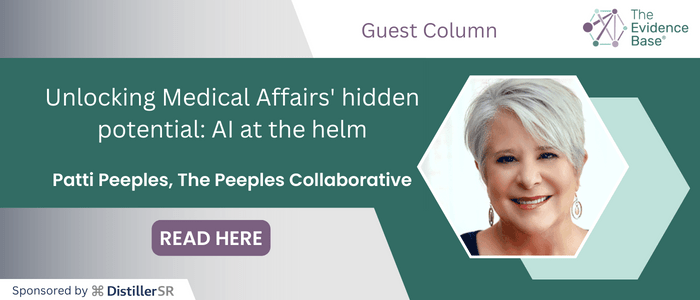Unlocking Medical Affairs’ hidden potential: AI at the helm

Medical Affairs divisions of the pharmaceutical industry are undergoing rapid transformation and modernization. No longer considered purely disease and product specialists, Medical Affairs groups are now sitting at the intersection of curating and creating holistic evidence ecosystems that demonstrate product value and optimize market access. They are recognized as critical to both drug development and commercial product launches.
This increased scope of activities has catalyzed the use of new tools such as artificial intelligence (AI), machine learning (ML), and natural language processing (NLP) to make Medical Affairs teams more efficient, agile and impactful. These tools can be utilized to improve the delivery of strategic and innovative insights to both internal and external stakeholders.
Moreover, by leveraging AI technologies, Medical Affairs professionals can overcome the limitations of human bias, access information efficiently, and gain valuable medical insights in a timely manner.
High-value applications of AI, ML and NLP for Medical Affairs groups
These can include:
Literature review and evidence synthesis
AI algorithms excel at identifying patterns and trends in complex and high-dimensional medical data. AI-powered tools can analyze vast amounts of scientific literature, clinical trials, and real-world data to identify relevant evidence and extract key insights. Trends, correlations, and associations that may not be readily apparent to humans may be identified.
Increasingly, Medical Affairs teams are tasked with reviewing tens of thousands of references to identify critical evidence, while evaluating publications of varying quality, publication source, methodology, outcomes and conclusions. AI-powered literature review software can automatically import newly published references, find relevant publications faster, deduplicate references (e.g., records), and classify them into pre-determined categories (e.g., study type, outcome variables, geography, etc.). In addition, AI can double-check exclusion decisions and validate the categorization of records.
These applications enable Medical Affairs professionals to drive higher value drug development, stay up-to-date with the latest research, and facilitate evidence-based decisions. Human error is reduced and time to insight may be considerably shortened.
Automatic information extraction
NLP techniques can be used to extract specific information from unstructured medical texts, such as clinical trial reports, patient records, or scientific articles. Some software focused on scientific literature review (DistillerSR CuratorCR) provides simplified data extraction through templates and configurable forms. This type of AI-powered literature review software facilitates complex data capture so that it is easy to understand and ready to analyze. Validations and calculations can be performed within the software, which reduces data cleaning and data conversions. Accuracy is enhanced.
While Medical Affairs teams may be growing in size, the demands on staff are also increasing. Therefore, staff efficiency is a core goal for many organizations. With AI-powered literature review software tools, data extraction times are reduced when data are re-used across literature reviews, which translates into more efficient staff time by reducing duplication of effort, particularly compared with manual extraction.
Real-time monitoring of medical literature
Some AI-powered software can continuously monitor medical literature, regulatory updates, and news sources to provide real-time alerts on emerging trends, safety signals, or competitor activities. This helps Medical Affairs professionals stay informed about developments in their field and enables proactive decision-making.
Adverse event detection and pharmacovigilance
ML algorithms can be trained to automatically detect patterns and classify adverse events and safety signals reported in various data sources, such as patient forums, social media, and electronic health records. NLP techniques can be employed to analyze clinical documentation, including progress notes, discharge summaries, incident reports, or large healthcare databases This AI-powered surveillance systems can identify patterns and trends in real time, allowing for Medical Affairs teams to take proactive measures to ensure patient safety.
Data analytics and predictive modeling
AI and ML techniques can analyze large datasets, including patient experience data, clinical trial results, safety assessments, electronic health records, claims, and other real-world evidence to identify patterns, correlations, and predictive models. For HEOR (health economics and outcomes research) teams, AI/ML can support cost-effectiveness and comparative effectiveness analyses by integrating complex data sets and conducting simulations to explore pricing and reimbursement dynamics based on various product profiles. As a result, Medical Affairs teams are able to prioritize targeted strategies and interventions, and demonstrate the value of their products to payers and healthcare systems.
Outcome prediction
AI algorithms can leverage historical patient data, clinical trial results and other insights to predict disease outcomes and treatment responses. By considering a variety of factors such as patient characteristics, disease progression, and treatment regimens, AI models can provide prognostic insights, helping researchers make informed decisions about treatment options and care plans.
Real-time decision support
NLP-based real-time decision support, virtual assistants or chatbots can be deployed to handle routine inquiries from healthcare professionals, patients, or external stakeholders. These tools can provide personalized information, support patient recruitment, and facilitate remote monitoring and telemedicine. With appropriate compliance and validation checks, these approaches may save time and allow efforts to be focused on more complex needs.
While the potential for AI in Medical Affairs is vast, there are also challenges that need to be addressed. One of the most significant challenges is the need to ensure that AI algorithms are transparent and unbiased. It is crucial to address challenges related to data privacy, algorithm bias, regulatory frameworks, and ethical considerations to maximize its potential benefits and ensure patient safety and privacy.
Conclusion
AI has enormous potential to transform Medical Affairs, providing newer, faster and more comprehensive insights and opportunities to improve patient outcomes and drive innovation in the pharmaceutical industry. Leveraging these new technologies to measure outcomes and bolster performance will empower organizations to become more agile and responsive to an evolving market. Medical Affairs teams utilizing these tools can play a pivotal role in overcoming the limitations of human bias, accessing information efficiently, and gaining valuable medical insights in a timely manner. This ultimately supports evidence-based decision making, enhances efficiency, and improves the overall quality of Medical Affairs activities.
 Author
Author
Dr Patti Peeples is an accomplished Healthcare Consultant and Health Economist who partners with senior management and boards of directors for business expansion, strategic planning and improved operations. As President of The Peeples Collaborative, Dr Peeples brings experience in for-profit start-ups, scaling, acquisitions, and product line extensions. Previously, she served as Vice President of Evidence and Content at Scientist.com, the world’s largest global sourcing marketplace for scientific research services, while also leading profitable marketing services expansion for the company. Dr Peeples was the Founder and CEO of HealthEconomics.Com, a global digital community of healthcare value, evidence and market access leaders acquired by Scientist.com. Widely published in the peer review literature and a frequent speaker and corporate educator, Dr Peeples serves on multiple journal editorial boards as well as facilitated graduate education through a decade of service on the Board of Grants for the American Foundation for Pharmaceutical Education. Dr Peeples holds a PhD in Health Economics from the University of the Sciences, an M.S. in Pharmaceutical Marketing, and is a registered pharmacist.
Sponsorship for this Guest Column was provided by DistillerSR.
DistillerSR automates every stage of the systematic review process for faster and more accurate evidence-based research. More than 300 of the world’s leading pharmaceutical and medical device companies, contract research organizations, governments, NGOs, and academic institutions trust DistillerSR to achieve transparent, audit-ready, and compliant literature reviews. As a result, healthcare researchers can produce more informed and time-sensitive health policies, clinical practice guidelines, and regulatory submissions.







